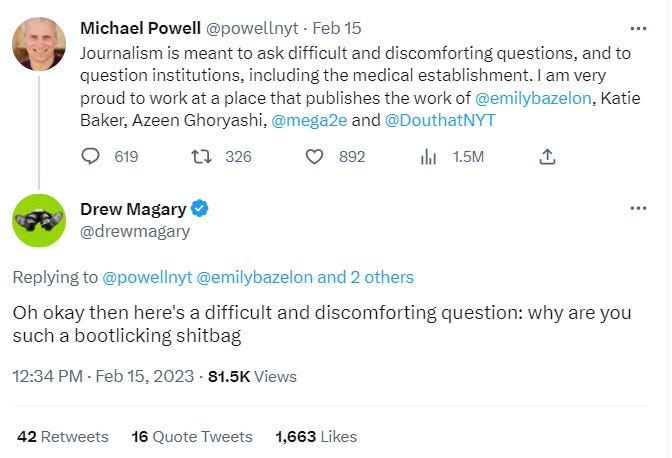On The Profound Disappointment Of Watching Drew Magary Turn Into This
It's easy to toss TRUTH BOMBS down at your moral lessers when you're always pulling the ladder up behind you
Earlier this week there was a big, ridiculous blowup over The New York Times’ coverage of trans issues. It was sparked by open letters from GLAAD and a group of writers, both of which accused the paper, groundlessly, of rampant transphobia. It resolved with a happy ending — the paper politely said “cool letter, but we aren’t really interested” — at least for now, and we’ll discuss it on the podcast. (One of the signatories was Gretchen Felker-Martin, a horror writer who has made a series of increasingly unhinged violent and sexual comments about me. I did a quick piece on that here, but I didn’t send it to my subscribers because I’m mindful of clogging your inboxes and viewed it as supplemental to my normal output here. It’s not going to count as one of my seven monthly articles.)
Twitter was on fire all day, because of course it was. I want to focus on one exchange in particular — between Michael Powell of The New York Times and Drew Magary of Defector. Powell rose to the defense of his colleagues, tweeting “Journalism is meant to ask difficult and discomforting questions, and to question institutions, including the medical establishment. I am very proud to work at a place that publishes [their work].” To which Magary responded: “Oh okay then here’s a difficult and discomforting question: why are you such a bootlicking shitbag.”
I’ve long been fascinated by Magary’s trajectory from writer I loved and read religiously to preening, hypocritical scold. I always read him back when he wrote for Deadspin, the Gawker sports site that first elevated him to stardom. During the NFL season I’d eagerly anticipate his weekly “Thursday Afternoon NFL Dick Joke Jamboroo,” which is basically what it sounds like: a preview of each game (rated by how excited he was for it on a scale of one to five “Throwgasms”) mixed with a lot of random, stereotypically masculine humor. Magary was a consistently funny writer (still is, for all I know), but he also had more heart and honesty than you would expect, given his target demographic: he wrote moving but still funny pieces about his attempts to lose weight and “The Loneliness Of The American College Transfer Student.”
Here’s how that second one started:
I remember being on the floor of my room in South Quad, bawling my eyes out on the phone. I couldn’t stop crying. Real, hard crying. The kind where your jaw unhinges and long, cathartic wails just come pouring right out of you. My mom was on the other end of the line, and for a very long time, she didn’t say anything. She just listened to me cry, because sometimes being there to listen to someone’s pain is the best (and only) thing you can do for him.
ME: (whispering) I’m so lonely.
HER: You’re so lonely.
ME: (crying) I’m so lonely.
It takes courage to write like this, and it’s important because it really fucking helps people. Men, in particular, are not good at discussing difficult emotions, are not good at admitting they need help or feel alone, and are really not good at admitting they have failed to live up to entrenched masculine standards, such as having a totally fun time at college (bro). Magary just… didn’t care! He went ahead and opened up, in painfully honest ways, about what college was like for him:
I grew up in the 1980s, which meant that I was conditioned by TV and movies to expect a certain kind of lifestyle once I attended college. I daydreamed all the time about joining a frat and having what I assumed would be unlimited access to booze and pussy. I’d have the time of my life. I’d make the best friends I’d ever have. I’d pull outlandish pranks, like crashing the Deathmobile into the grandstands and getting that Dean Wormer good. I’d become a better, more confident version of myself. Also, I’d somehow develop quarterbacking skills and win a Rose Bowl. That was the plan. I assumed that happened for everyone in college.
Of course, that didn’t happen for me. The fact is that I don’t keep close ties with anyone I know from college. Not Michigan. Not Colby, where I eventually ended up. I don’t email anyone from those schools. I don’t check up on them on Facebook. I don’t see them at weddings. And that’s because I didn’t really have many friends in college. Two, maybe. Maybe less. Granted, my goals were not exactly noble: friends, booze, casual sex. Only one of those things is admirable to pursue. But that doesn’t mean the loneliness was any less real, or any less consuming.
As the people Magary used to make fun of but who he now (to borrow a phrase) bootlicks for might put it, this article really hit me right in the feels. Because that was me! In a lot of ways, at least.
When I read this piece I was about five years out from a fairly fractured college experience (I actually transferred to Michigan rather than out of it like Magary did). My own undergraduate years weren’t a tragedy or anything, and I don’t think I had it as bad as he did, but it was — and is — a disappointment. The whole college thing just never really clicked. So it was extremely helpful, at that point in my life, to read a guy who I felt kinship with on other fronts (love of the NFL, love of dick jokes, love of combining the NFL with dick jokes) open up in such a raw manner.
Keep reading with a 7-day free trial
Subscribe to Singal-Minded to keep reading this post and get 7 days of free access to the full post archives.



